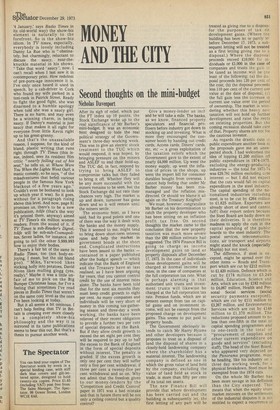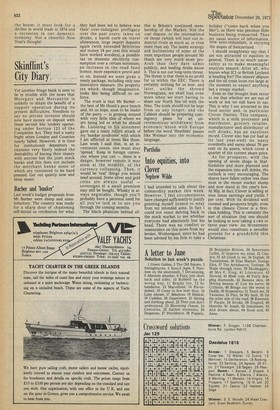Second thoughts on the mini-budget
Nicholas Davenport
After its sigh of relief, which put the FT index up 10 points, the Stock Exchange woke up to the real significance of Mr Barber's mini-budget. It was an economic feint_ designed to hide the real political strategy of the Government's three-day working week. This was to give an electric shock treatment to the TUC which would respond, it was hoped, by bringing pressure on the miners and ASLEF to end their hold-up. The TUC did, in fact, respond by trying to bring ASLEF to compromise talks but they failed to bring it off. Whether they will be any more successful with the miners remains to be seen, but the Stock Exchange did not rate their chances very high. The market is up and down, turnover has gone down and so it will remain until the miners settle.
The economic feint, as I have said, had its good points and one of them was the way it dealt with the banks and the money supply. This it seemed to me, might tend to bring down short-term interest rates and help the market in government bonds at the short end. Complicated instructions have been issued to the banks — contained in a paper published after the budget speech — which indicate that the Bank of England and the Treasury have at last realised, as I have been arguing for years, that you cannot control credit by the use of interest rates alone. The banks have been told that for the next six months they must keep credit growth to eight per cent. As many companies and individuals will be very short of money in this coming tax-gathering season and three-day a week working, the banks have been relieved of their recent obligation to provide a further two per cent of special deposits at the Bank. But if they allow credit growth to exceed the set eight per cent they will be required to pay up to half the excess to the Bank of England in the form of special deposits without interest. The penalty is graded. If the excess growth is only one per cent they will suffer only a five per cent withdrawal; if three per cent a twenty-five per cent withdrawal and so on. Why not admit that the freedom given to our money-lenders by the 'Competition and Credit Control' paper in 1971 was a bad mistake and that in future there will be not only a ceiling control but a quality control? Give a money-lender an ina and he will take a mile. The banks, as we know, financed property speculators and financial profiteers before industry got down to stocking up and investing. What is more they encouraged the consumer boom by handing out credit cards, Access cards, Diners' cards, etc, etc — a gross exploitation of the taxation reliefs which the Government gave to the extent of nearly £4,000 million. Up went the money supply, up went the inflation of prices in the shops, up went the import bill for consumer durables bought from overseas. I cannot help feeling that under Mr Barber money has been mismanaged and the reflation misdirected. Or should we blame it all again on the Treasury Knights?
We must, however, congratulate Mr Barber on his determination to catch the property developer who has been sitting on an inflation profit tax free. On second thoughts the market came to the conclusion that the new property taxation was much more severe than the £80 million estimate had suggested. The 1974 Finance Bill is going to charge as income development gains on land or property disposals after December 17, 1973. In the case of individuals these development gains will be charged at normal income tax rates; in the case of companies at he full corporation tax rate. What is perhaps alarming is that authorised unit trusts and investment trusts will likewise be charged at the full corporation tax rate. Pension funds, which are at present exempt from tax on capital gains and on investment income, will not be exempt from the proposed charge on development gains. This seems to put paid to property bonds.
The Government obviously intends to catch Mr Harry Hyams and other developers because it proposes to treat as a disposal of land the disposal of shares in a closely-held landowning company where the shareholder has a material interest. The landowning company is defined as one in which the gross value of land held by the company, excluding the value of land held as stock in trade, is more than fifty per cent of its total net assets.
The new Finance Bill will provide that where development has been carried out and the building is subsequently let, the first letting of any part will be treated as giving rise to a disposai for the purposes of tax .cin development gains. (Where the building has been let or partly le.: before December 17, 1973, a subsequent letting will not be treated as a first letting giving rise to a disposal.) Where the disposal proceeds exceed £10,000 foi. individuals or £1,000 in the case of companies and trusts the gain zo be taxed as income will be toe least of the following: (a) the disposal proceeds less 120 per cent of \ the cost; (b) the disposal proceeds less 110 per cent of the current use value at the date of disposal; (c) the full gain less the increase in current use value over the period of ownership. The market is wondering whether this heavy new taxation will not hold up further development and raise the rents • on existing properties. But the coming recession should take care of that. Property shares are not for the cautious investor.
As regards the drastic cuts in public expenditure another look at the proposals gave me an unexpected shock. I had welcomed the idea of lopping £1,200 million off public expenditure in 1974-1975, excluding the energy-producing industries — the total for 1973-74 was £29,781 million excluding oebt interest — but I did not expect that the cuts would fall on capital expenditure in the steel industry. The capital spending of the nationalised industries including steel, is to be cut by £264 million to £1,625 million. Exporters are already short of steel and cannot fulfil their export orders because the Steel Board are badly down on their deliveries. It is therefore madness to apply the cuts in the capital spending of the public boards to the steel industry. The postal services, telecommunications, air transport and airports might stand the knock (especially. Maplin) but not steel.
The difference, if steel is excepted, might be spread over the other items — Roads and Transport which are cut by £212 million to £1,420 million, Defence which is cut by £178 million to £3,240 million, Education, Science and Arts, which are cut by £182 million to £4,067 million, Health and Personal Social services (social security payments excepted), which are cut by £111 million to £3,267 million, and Environmental Services which are cut by £148 million to £1,370 million. The reductions proposed amount to no less than one-fifth in the total of capital spending programmes and to one-tenth in the total of "procurement of supplies and other current expenditure on goods and services" (excluding staff). The head of the Steel Board, who appeared very dejected on the Panorama programme, must be heading, like his industry on Li three day working week, for a physical breakdown. Steel must be exempted from the 1974 cuts.
On the whole Mr Barber has been more savage in his deflation than the City expected. This means that when the equity share market recovers on the settlement of the industrial disputes it is not entitled to expect a recurrence ot
they had been led to believe was their over-indulgent profligacy over the past years: takes on drinks, a harsh curb on travel allowances, large import deposits again (with extended deliveries and money 18 per cent this would have worked wonders), a possible tax on domestic electricity consumption over a certain minimum, an increase in the road fund licence, more expensive petrol and so on. Instead we were given a mealy package, including only one innovative measure, the property tax which, though imaginative, looks like being difficult to enforce.
The truth is that Mr Barber — the best of Mr Heath's poor bunch and, let us hope, soon to be leader of the party — is groping around with very little idea of where we are being led or what he should do. Listening to his statement gave me a nasty return attack of my 'bunker syndrome' with which I am afflicted at times like these. Last week I said that, in an investment sense, one must stay 'spread.' Keep in foreign currencies where you can — there is a danger, however remote it may seem at the moment, of the currency collapsing. Then, it would be 'real' things you would need around. Some silver and gold coins are always useful — sovereigns at a small premium may still be bought. Whisky is always negotiable, though you'll probably have a personal need for all you've laid in to see you through the coming months, The black phantom behind all this is Britain's continued membership of the Market. Not the coal dispute, or the international oil threat (which will hurt our industrial rivals as much as, or even more than us). The latent strategy and inclinations of some of the most important people around Mr Heath are very much more proArab than they dare admit publicly, and leading Arabs know it. This is not our long-term threat. The threat is that there is no profit for us within the EEC. There is certainly nothing for us now, and later, unlike the shrewd Norwegians, we shall lose even more when we start having to share our North Sea oil with the Nine. The truth should not be kept from us any longer, and the Cabinet should be preparing contingency plans for an unceremonious withdrawal from economic 'union with Europe before the word 'Heathian' passes like Weimar into the economic language.



























 Previous page
Previous page